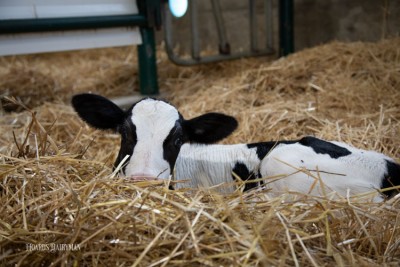Narrow Down the Cause of Calf Scours

Narrow down the cause of calf scours
BY ABBY BAUER, ASSOCIATE EDITOR
The two or so months prior to weaning really lay the foundation for a healthy, productive dairy animal. It is important to review the success of your preweaned calf program every now and then.
Margaret Quaassdorff, dairy management specialist for Cornell University Extension, talked about factors to track when it comes to preweaned calves during a Pro-Dairy "Trouble shooting herd health issues on your dairy" podcast. One of them is percent death loss.
"The overall benchmark goal is to be under 5% of calves that die prior to weaning," she shared. Beyond that number, Quaassdorff said to also track the causes contributing to death loss.
"Scours is one of the most common issues with calves, but troubleshooting why they have scours can be tricky," she said. Quaassdorff explained that scours can be caused by pathogenic factors, nutritional factors, or a combination of the two.
"It is important to consider age," she said. "If scours occur during the first few days of life, it's a good hint to look back at the maternity area for clues." She explained that scours this early in life are typically caused by E. coli bacteria and result from a cleanliness issue — a dirty calving environment, dirty feeding equipment, or colostrum that wasn't collected in a clean manner.
"Your extension specialist, veterinarian, or nutritionist may be able to help you conduct a cleanliness audit to help pinpoint sources of contamination," she added.
If scours occur closer to a week of age, Quaassdorff said that is more likely a virus issue, and this warrants a call to a veterinarian to discuss vaccination protocols.
Fix feeding practices
Scours can also come from nutritional factors. According to Alycia Drwencke, another dairy management specialist for Cornell University Extension, "One common myth is that nutritional scours result from feeding too much milk, but that is rarely the case. Loose manure does not equate to scours."
She said more commonly, nutritional scours result from an issue with the milk being fed. That can include improper or inconsistent percent solids in milk replacer or inconsistent or inadequate mixing technique.
If calves are fed milk at a temperature too low or too high, scours can occur as well. To reduce the risk, mix milk or milk replacer at 110°F to 120°F. By the time calves are fed, Drwencke said it should be cooled to 101°F to 105°F.
A full potential milk diet can be fed at a rate of 2.5 pounds of milk solids in 8 to 12 quarts per day without scours, she said. Milk should be delivered two times a day, three times a day, or multiple times per day with an automatic feeder.
Also, pay attention to the calf starter. "It's important to feed starter with quality, palatable ingredients, and that the percent of fines or dust in the grain is minimal. Calves typically don't eat fines, and they often won't pick around them," Drwencke shared.
She said to make sure grain stays fresh and dry. "After a rain event or if water or milk splashes into the feed, it becomes much less appealing to the calf and more appealing to flies," she said.
Wet feed or manure in starter makes it more likely to grow mold or harbor other pathogens that can cause health problems, reduce feed intake, and prevent growth in your calves.
Finally, don't forget that water is also an important nutrient for calves. "Providing free access to water at all times helps maximize grain consumption and proper hydration," Drwencke said.
Upcoming Events
Crops, Cows & Critters - Southwest New York Dairy, Livestock & Field Crops Newsletter Sponsorship
December 19, 2025
Our two forms of publications feature research-based and timely information from our four specialists, listed to the right, along with local event notifications and Cornell University outreach. This information is provided to participants who range from dairy, livestock, and field crops producers to agricultural suppliers and consultants.
Weekly Email Update: Shared with 625+ households who have signed up with our program.
Monthly Paper Mailer: To reach our stakeholders and farmers who lack internet access, we send out a monthly mailer where your company's logo and contact information would be featured with a mailing list of 330+ households.
If you sponsor our weekly and monthly publications you reach approximately 955 households.
Visit our website to view our newsletters!
2025 Cornell Food Beverage & Animal Feed Manufacturer Survey
December 19, 2025
Industry and Educational Advocates for New York State's Food, Beverage, and Animal Feed Manufacturing industries:
As you know, NYS has a diverse food and beverage manufacturing industry, in both the types of industries that exist and the wide distribution of firms by scale. Many manufacturing firms have strong backward linkages to agricultural production sectors in the state that support both farm-level and downstream food industry firms and consumers. In collaboration with the New York State Department of Agriculture and Markets, a team from Cornell University's Charles H. Dyson School of Applied Economics and Management has recently rolled out the 2025 New York State Food, Beverage, and Animal Feed Manufacturer Survey. The industry will benefit from an updated assessment of the industry that informs private and public investments and opportunities to support firm growth and improved profitability.
Cornell Organic Field Crops & Dairy Conference
March 6, 2026
Waterloo, NY
Farmers, researchers, educators, and agricultural service providers from across the Northeast are invited to the 2026 Cornell Organic Field Crops & Dairy Conference, held Friday, March 6, 2026, from 8:00 a.m. to 4:30 p.m. at the Lux Hotel & Conference Center in Waterloo, N.Y.
Co-hosted by New York Soil Health and Cornell CALS, the annual conference brings together leaders in organic grain, dairy, and livestock systems to share practical tools, new research, and farmer-tested strategies to support resilient and profitable organic production.
Announcements
No announcements at this time.





